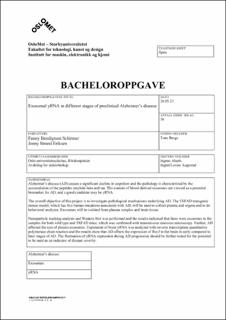| dc.description.abstract | Alzheimer’s disease (AD) causes a significant decline in cognition and the pathology is characterized by the
accumulation of the peptides amyloid-beta and tau. The content of blood-derived exosomes are viewed as a potential
biomarker for AD, and a good candidate may be yRNA.
The overall objective of this project is to investigate pathological mechanisms underlying AD. The 5XFAD transgenic
mouse model, which has five human mutations associated with AD, will be used to collect plasma and organs and to do
behavioral analyzes. Exosomes will be isolated from plasma samples and brain tissue.
Nanoparticle tracking analysis and Western blot was performed and the results indicated that there were exosomes in the
samples for both wild type and 5XFAD mice, which was confirmed with transmission emission microscopy. Further, AD
affected the size of plasma exosomes. Expression of brain yRNA was analyzed with reverse transcriptase quantitative
polymerase chain reaction and the results show that AD affects the expression of Rny3 in the brain in early compared to
later stages of AD. The fluctuation of yRNA expression during AD progression should be further tested for the potential
to be used as an indicator of disease severity. | en_US |
